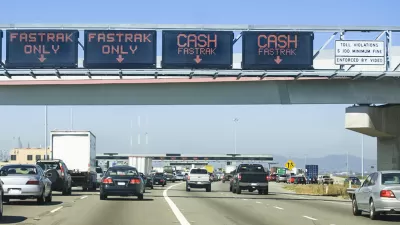Transportation for America recaps the first meeting in three years by the House Ways and Means Committee to address transportation funding. Chairman Paul Ryan decried the $63 billion bailout of the Highway Trust Fund but ruled out a gas tax hike.
"For the first time since 2012, the House of Representatives held a hearing focused on funding the nation’s transportation system," writes Stephen Lee Davis, Deputy Communications Director for Transportation for America.
Before the hearing, Rep. Earl Blumenauer (D-OR) held a press conference featuring a coalition of groups who support his bill to raise new revenue in the House by phasing in a 15-cent increase in the gas tax. Civil engineers, general contractors, roadbuilders, public transportation operators and T4America director James Corless spoke at the press conference to support Rep. Blumenauer’s case that Congress’ inaction is negatively impacting our nation’s economy and action is long overdue.
In his opening statement, Chairman Paul Ryan admits that "instead of fixing the problem, we’ve dodged it. Five times we’ve come up with temporary solutions and transferred money from the general fund into the trust fund—which, in English, means we’ve patched a pothole and not fixed the problem. We’re talking over $63 billion in total. [Italics added]. And according to the latest projections, we’re looking at a $168 billion shortfall over the next ten years.]
Ironically, Ryan ruled out the obvious solution that would not require a general fund transfer. In fact, he paradoxically offered one of the reasons why the gas tax needs to be raised, increasing vehicle fuel efficiency standards, to justify not raising the tax:
People have been using less gas. They’re driving more fuel-efficient cars. You get a lot more miles to the gallon than you used to. And so gas just doesn’t track use as well as it used to. And we can’t just chase fuel efficiency with higher taxes.
So I want to make very clear: I’m against raising the gas tax. There’s not much happening in this economy to help it grow, but lower gas prices is one of them...So we are not raising gas taxes—plain and simple.
In his conclusion, he appeared to open the door to "devolution", the movement that would eliminate the gas tax by handing transportation authority to states.
“But there are lots of ideas out there. And that’s why we’re here today: to hear more about them. There’s talk of handing more authority over to the states . . . making greater use of tolls . . . creating more public-private partnerships. There are a lot of ideas worthy of consideration. But either way, we need to find a real solution—a permanent solution.
Noticeably absent was mention of taxing overseas profits, known as a repatriation tax.
During the meeting, "Rep. Jim Renacci (R-OH), who has put forward a separate plan to index the gas tax to inflation and set up a mechanism to provide long-term transportation funding, noted that 'short-term fixes cost money in delay and uncertainty,'" writes Davis.
He shared a story about meeting with constituents, including some tea party members, on transportation issues. He said that they told him, “‘Quit going to the general fund and taking dollars…what you’re doing is passing it onto our children and grandchildren. What I’d be willing to do is pay a user fee as long as I get my roads and bridges fixed.’ We have to come up with a long-term solution, we can’t continue to go down this path,” he said. [See his press release].
"We can hope that the newfound willingness to discuss the challenging revenue question will lead members of Congress to build consensus around a funding proposal suitable for the nation’s need," concludes Davis in a positive note.
FULL STORY: House takes first step in process to keep the nation’s transportation fund solvent

Alabama: Trump Terminates Settlements for Black Communities Harmed By Raw Sewage
Trump deemed the landmark civil rights agreement “illegal DEI and environmental justice policy.”

Study: Maui’s Plan to Convert Vacation Rentals to Long-Term Housing Could Cause Nearly $1 Billion Economic Loss
The plan would reduce visitor accommodation by 25% resulting in 1,900 jobs lost.

Why Should We Subsidize Public Transportation?
Many public transit agencies face financial stress due to rising costs, declining fare revenue, and declining subsidies. Transit advocates must provide a strong business case for increasing public transit funding.

Paris Bike Boom Leads to Steep Drop in Air Pollution
The French city’s air quality has improved dramatically in the past 20 years, coinciding with a growth in cycling.

Why Housing Costs More to Build in California Than in Texas
Hard costs like labor and materials combined with ‘soft’ costs such as permitting make building in the San Francisco Bay Area almost three times as costly as in Texas cities.

San Diego County Sees a Rise in Urban Coyotes
San Diego County experiences a rise in urban coyotes, as sightings become prevalent throughout its urban neighbourhoods and surrounding areas.
Urban Design for Planners 1: Software Tools
This six-course series explores essential urban design concepts using open source software and equips planners with the tools they need to participate fully in the urban design process.
Planning for Universal Design
Learn the tools for implementing Universal Design in planning regulations.
Smith Gee Studio
Alamo Area Metropolitan Planning Organization
City of Santa Clarita
Institute for Housing and Urban Development Studies (IHS)
City of Grandview
Harvard GSD Executive Education
Toledo-Lucas County Plan Commissions
Salt Lake City
NYU Wagner Graduate School of Public Service



























